Summary: In the search for the best booking apps for massage therapists in 2025, this article highlights five top solutions designed to streamline scheduling and client management. Key features of the recommended apps include efficient online booking, customizable intake forms, and marketing tools. While options like MassageBook and ClinicSense are notable, SPRY stands out as the #1 solution for its all-in-one platform, offering comprehensive features that enhance efficiency and ease of use for massage therapy businesses.

Running a massage therapy business without the best booking app feels like giving a massage with your eyes closed - you could do it, but why make things harder?
The massage industry is on fire right now. Market experts predict values will hit $164 billion by 2034. Success in this booming field needs more than just talented hands. More therapists are turning to digital tools to handle their schedules and money. The right massage booking software has become a vital part of the business. Massage therapists need quick systems to stay on top of their packed schedules, SOAP notes, billing, and marketing. On top of that, the right software can make existing processes smoother and fix common business headaches.
The search for perfect massage scheduling software can be tricky. Monthly prices range from $16 to $169. Some tools offer smooth calendar sync to stop double-booking. Others come packed with complete practice management features. This piece looks at the five top booking apps for massage therapists. We've tested each one to help you pick the best fit for your business in 2025.
MassageBook
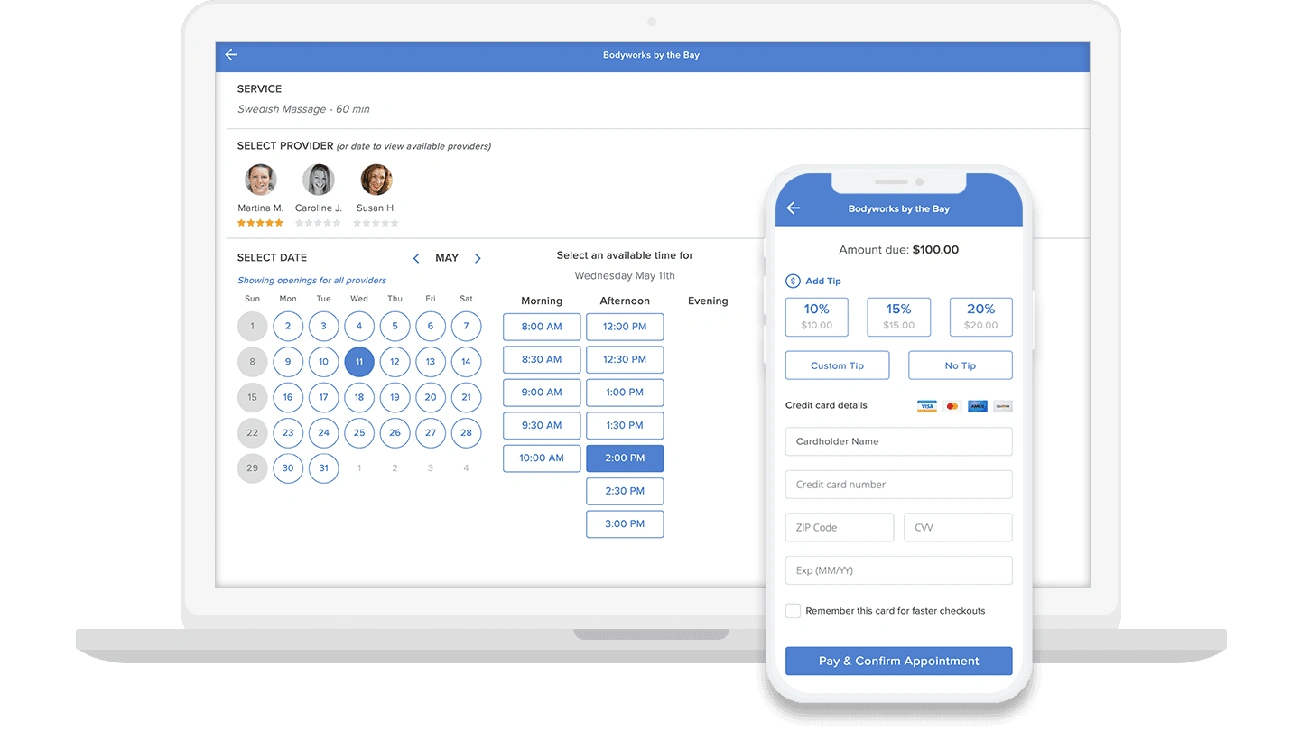
MassageBook is a solution built by a former massage therapist who knew the profession's challenges firsthand. This personal touch shows in every feature and function of the platform.
Key Features
Efficient Booking System - Accept online bookings with Google Calendar integration. Works with Facebook and Instagram for social media booking.
Digital SOAP Notes - Secure digital notes with unlimited storage. The premium version includes anatomical drawings for detailed documentation.
Customizable Intake Forms - Digital forms that clients complete before arrival, with health alerts for medications and conditions.
Marketing Tools - Email marketing templates, gift certificates, and promotional offers to attract and retain clients.
Mobile App - The MassageBook Manager provides full practice management on the go with four calendar views and streamlined checkout.
Website Builder - Create SEO-optimized websites connected to the MassageBook Directory.
Directory Listing - Access to the most active directory of massage professionals in the US, boosting Google search visibility.
Pros and Cons
Pros:
- Built specifically for massage therapists
- Directory listing boosts search rankings
- Multiple platform integrations
- Complete client management
- AMTA and ABMP member discounts
Cons:
- Pricing can be unclear
- Some program glitches
- Limited add-on features
- Learning curve for new users
Pricing
Best For
- Solo practitioners seeking all-in-one solutions
- Mobile therapists offering in-home services
- New business owners building online presence
- Tech-cautious professionals needing intuitive interfaces
User rating: 4.7/5 from 427+ reviews.
ClinicSense
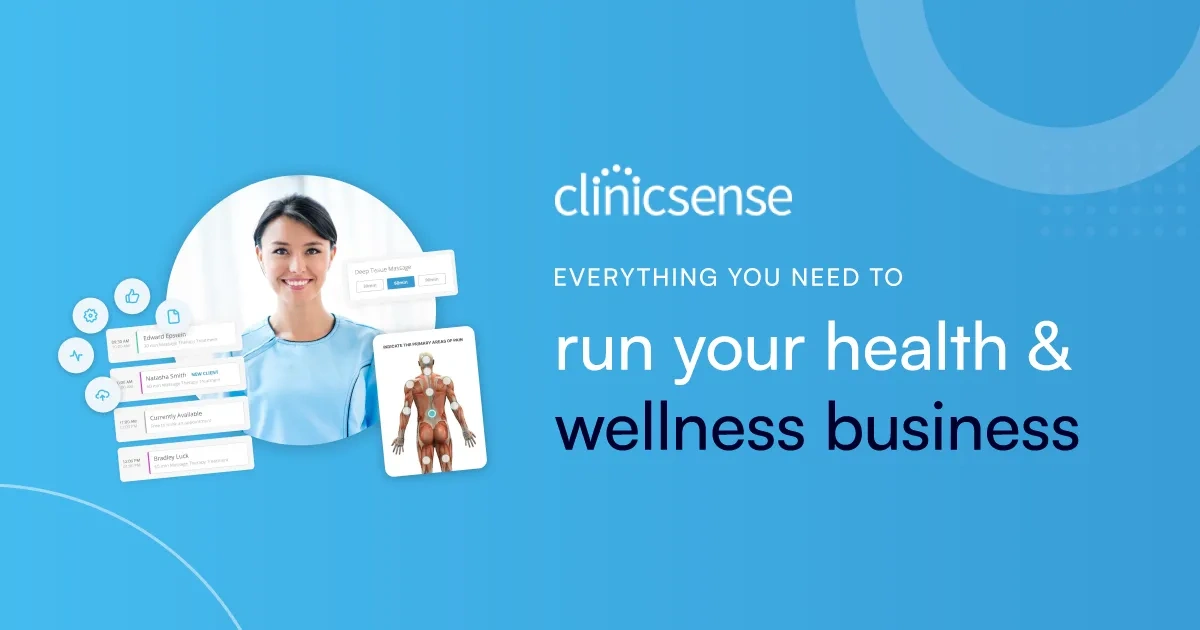
ClinicSense acts as a complete business partner for massage therapists. This all-in-one solution streamlines scheduling, client management, and documentation. Users rate it 4.8/5, ranking it as the #1 easy-to-use software for five straight years.
Key Features
Fully Customizable SOAP Notes - Create personalized templates for different services with complete customization options.
Digital Intake and Consent Forms - Pre-built or custom forms sent automatically based on booked services.
Online Booking and Reminders - 24/7 client booking with automatic reminders and email tracking.
No-Show Guard™ - Protects against missed appointments through advance payment or credit card requirements.
Marketing Automation - Google review boosters, availability summaries, wellness check-ins, birthday emails, and referral campaigns.
Financial Management - Automatic invoicing, Square payment integration, treatment packages, and detailed financial reports.
Pros and Cons
Pros:
- Extremely user-friendly (4.9/5 rating)
- Extensive customization options
- Excellent customer support (4.9/5)
- 72% reduction in paperwork time
- HIPAA compliance
Cons:
- Basic plan lacks SMS reminders
- Recent price increases
- Formatting issues with printed notes
Pricing
Best For
- Detail-oriented practitioners needing custom documentation
- Client-focused businesses requiring engagement tools
- Efficiency-minded professionals wanting to reduce admin work
- Square payment users
Mindbody
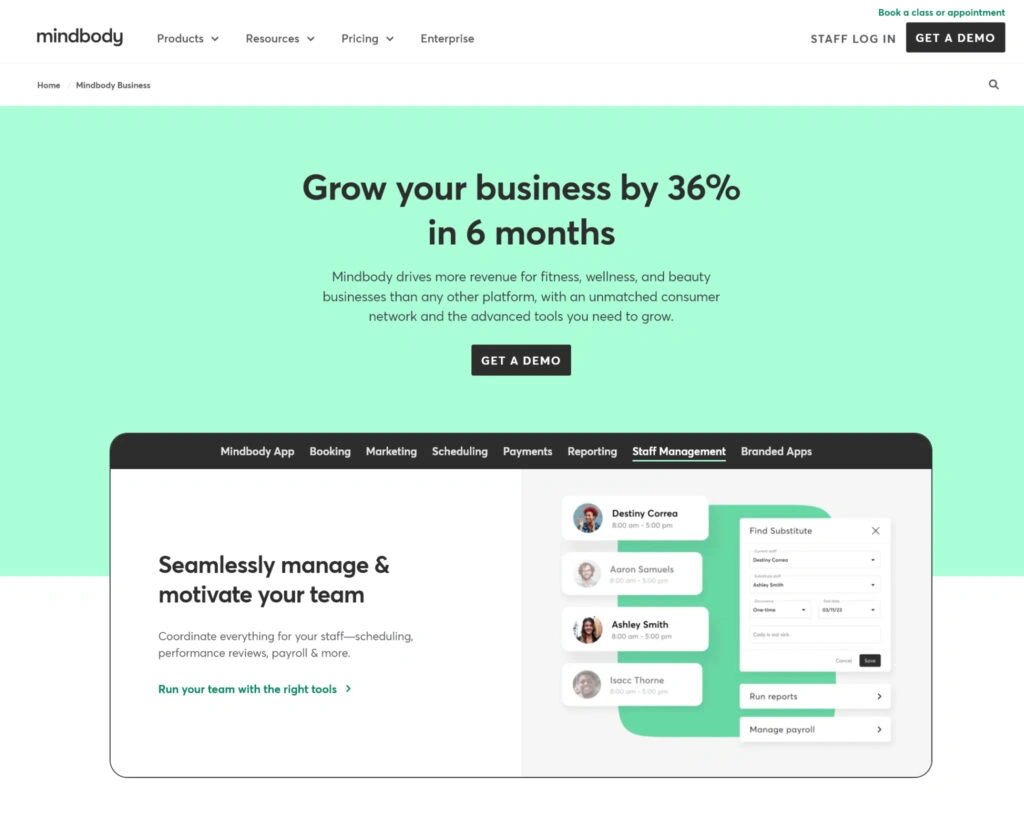
Mindbody surpasses typical booking apps, functioning as a comprehensive business management platform connecting massage therapists to over 2.8 million potential clients through its marketplace.
Key Features
Expansive Client Network - Access to millions of active users who book over 712 million appointments annually.
Comprehensive Management System - Flexible scheduling, detailed client profiles, and resource management.
Marketing Automation - Partnership with Attentive enables personalized email and SMS campaigns.
Lead Management - Tools for segmenting prospects and managing sales funnels.
Messenger[ai] - AI-powered assistant handles missed calls and automates booking.
Analytics Dashboard - Real-time insights into sales, visits, and membership trends.
ClassPass Integration - Revenue guarantee access to ClassPass users.
Pros and Cons
Pros:
- Huge client marketplace exposure
- All-in-one business solution
- Unlimited users per location
- 24/7 AI booking assistant
- Advanced analytics
Cons:
- Higher price point
- 12-month contract requirement
- Complex learning curve
- Customer service challenges
- Frequent bugs reported
Pricing
Best For
- Multi-location practices
- Established businesses seeking growth
- Full-service wellness centers
- Tech-forward businesses embracing advanced features
Users report a 26% increase in bookings within six months.
Square Appointments
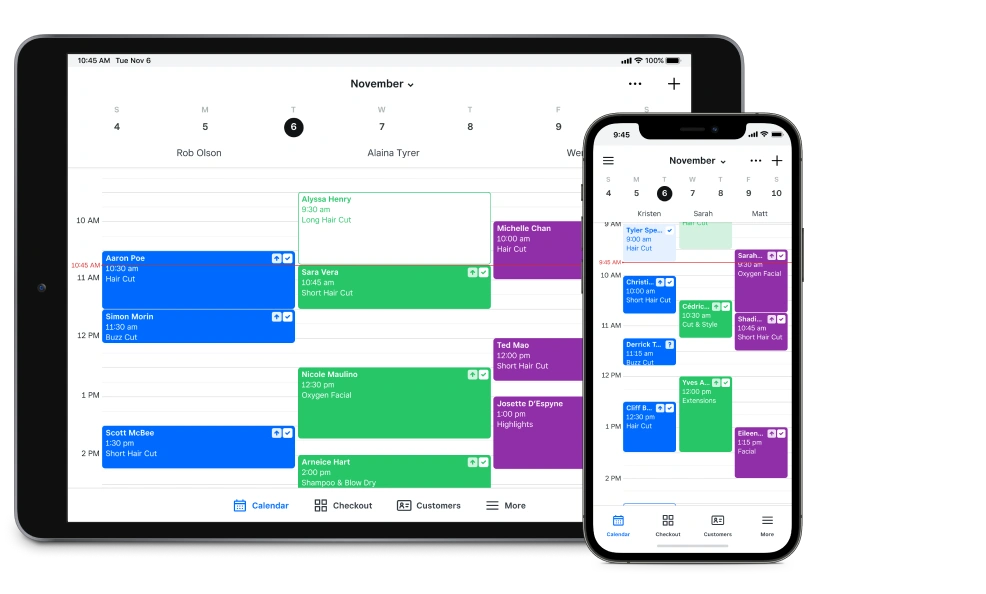
Square Appointments combines scheduling with powerful payment processing integration. Offers excellent value with no upfront costs for solo practitioners.
Key Features
Comprehensive Scheduling - Clean calendar interface with color coding, appointment limits, and time blocking.
Client-Friendly Booking Website - Free customizable site with social media and Google Business integration.
Automated Communications - Text/email reminders plus Square Assistant for appointment management.
Integrated Payment Processing - Seamless card transactions, digital wallets, stored cards, and installment options.
Resource Management - Assign specific rooms, equipment, or stations (Premium plan).
Business Analytics - Performance metrics, sales trends, and projected revenue reports.
Pros and Cons
Pros:
- Free plan for individual therapists
- User-friendly interface
- Excellent payment integration
- Unlimited calendars
- Strong mobile apps
Cons:
- Limited booking customization
- Higher payment processing fees
- Paid plans are required for basic features
- Not massage-specific
Pricing
Best For
- Independent massage therapists
- Mobile professionals needing flexible payments
- Practitioners selling products
- Growth-minded businesses want scalable solutions
Vagaro
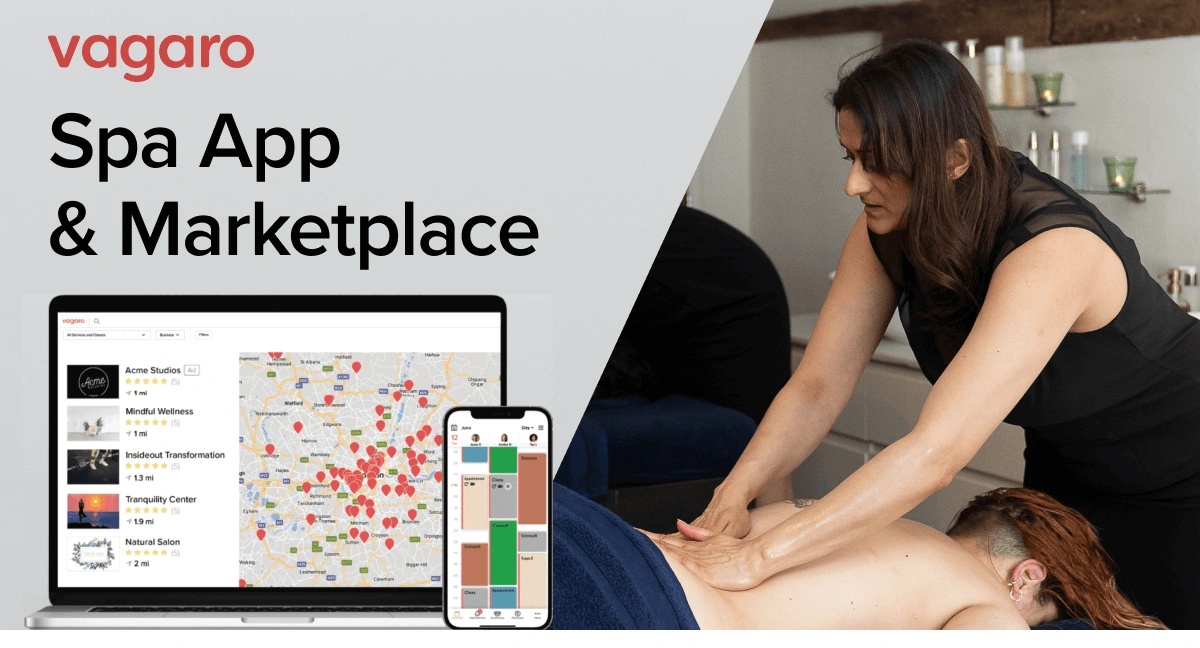
Vagaro serves over 221,000 massage therapy professionals with an all-in-one platform connecting therapists to more than 30 million potential clients.
Key Features
Advanced Scheduling - Customizable intervals, automated reminders, waitlist management, and credit card security.
Multi-Channel Booking - Integration with Apple Maps, Instagram, Facebook, Yelp, plus embeddable widgets.
SOAP Notes & EMR - HIPAA-compliant electronic records with customizable documentation.
Connect Messaging - Two-way SMS platform with centralized conversation tracking.
Integrated Payments - Multiple payment methods, including contactless options and recurring memberships.
Marketing Tools - Automated campaigns and loyalty programs for client retention.
Pros and Cons
Pros:
- Comprehensive business platform
- Free marketplace listing (8% booking increase)
- Major platform integrations
- 24/7 support
- Clear performance reporting
Cons:
- Clients must create Vagaro accounts
- Extra costs for premium features
- Limited customization
- Occasional system slowdowns
Pricing
No long-term contracts; 30-day free trial:
- Base Plan: $30/month (1 user, 1 location)
- Additional Users: $10/month each
- Text Marketing: Starting at $20/month
- Forms & SOAP Notes: $10/month
- Payment Processing: Starting at 2.2% + $0.19
Best For
- Small to medium wellness businesses
- Multi-service practitioners
- Social-first businesses
- Mobile-first practitioners
Comparison Table
Conclusion
The right booking app can transform how massage therapists run their businesses. Your choice should align with your budget, growth plans, and technology comfort level.
For Solo Practitioners: MassageBook offers industry-specific features and directory benefits, while Square Appointments provides excellent free options.
For Growing Practices: ClinicSense excels in customization and marketing automation, while Vagaro offers comprehensive features at fair pricing.
For Established Businesses: Mindbody provides unmatched marketplace exposure despite higher costs.
Take advantage of free trials to test workflows and features before committing. The ideal solution should match your business model, support your growth plans, and enhance your client communication strategy.
FAQs
Q1: What key features should massage booking apps have in 2025?
Look for online scheduling, customizable SOAP notes, client management, automated reminders, payment processing, and marketing features. Advanced options include AI assistants and marketplace exposure.
Q2: How can software increase massage bookings?
Utilize online booking widgets, automated marketing campaigns, waitlist management, social media integration, and marketplace listings to connect with potential clients.
Q3: What's the price range for massage booking software?
Prices range from free options for individual practitioners to $699+ monthly for premium solutions. Most mid-range options cost $30-$100 monthly.
Q4: Which app is best for independent therapists?
MassageBook offers industry-specific features and directory benefits, while Square Appointments provides free tiers with integrated payments.
Q5: How do booking apps help with client retention?
Through automated reminders, loyalty programs, targeted marketing campaigns, easy rebooking options, and client relationship management tools that enable personalized service.
Reduce costs and improve your reimbursement rate with a modern, all-in-one clinic management software.
Get a DemoLegal Disclosure:- Comparative information presented reflects our records as of Nov 2025. Product features, pricing, and availability for both our products and competitors' offerings may change over time. Statements about competitors are based on publicly available information, market research, and customer feedback; supporting documentation and sources are available upon request. Performance metrics and customer outcomes represent reported experiences that may vary based on facility configuration, existing workflows, staff adoption, and payer mix. We recommend conducting your own due diligence and verifying current features, pricing, and capabilities directly with each vendor when making software evaluation decisions. This content is for informational purposes only and does not constitute legal, financial, or business advice.










